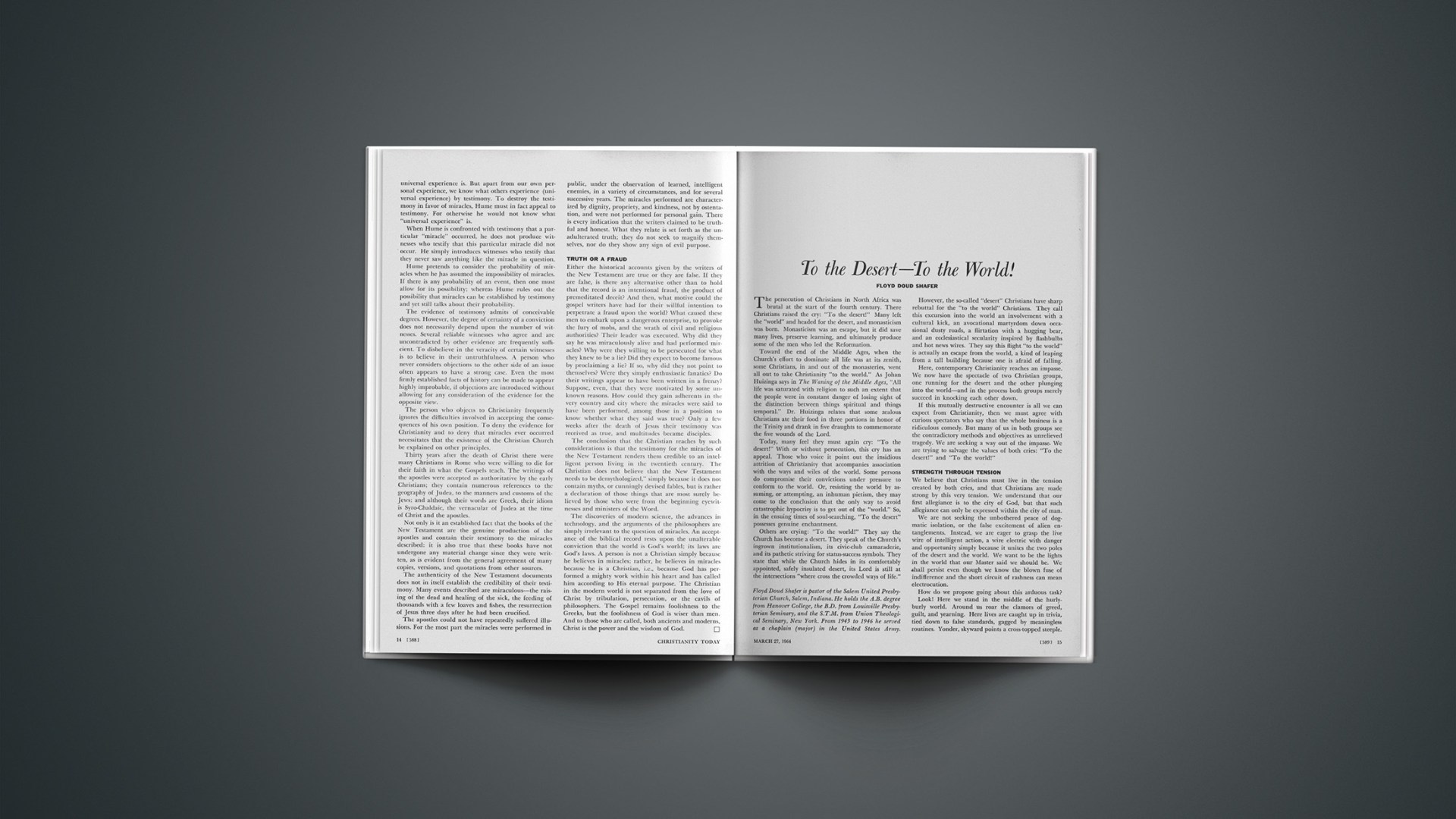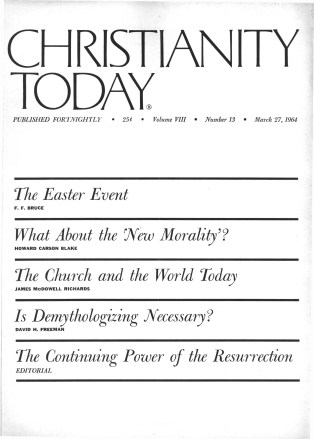The persecution of Christians in North Africa was brutal at the start of the fourth century. There Christians raised the cry: “To the desert!” Many left the “world” and headed for the desert, and monasticism was born. Monasticism was an escape, but it did save many lives, preserve learning, and ultimately produce some of the men who led the Reformation.
Toward the end of the Middle Ages, when the Church’s effort to dominate all life was at its zenith, some Christians, in and out of the monasteries, went all out to take Christianity “to the world.” As Johan Huizinga says in The Waning of the Middle Ages, “All life was saturated with religion to such an extent that the people were in constant danger of losing sight of the distinction between things spiritual and things temporal.” Dr. Huizinga relates that some zealous Christians ate their food in three portions in honor of the Trinity and drank in five draughts to commemorate the five wounds of the Lord.
Today, many feel they must again cry: “To the desert!” With or without persecution, this cry has an appeal. Those who voice it point out the insidious attrition of Christianity that accompanies association with the ways and wiles of the world. Some persons do compromise their convictions under pressure to conform to the world. Or, resisting the world by assuming, or attempting, an inhuman pietism, they may come to the conclusion that the only way to avoid catastrophic hypocrisy is to get out of the “world.” So, in the ensuing times of soul-searching, “To the desert” possesses genuine enchantment.
Others are crying: “To the world!” They say the Church has become a desert. They speak of the Church’s ingrown institutionalism, its civic-club camaraderie, and its pathetic striving for status-success symbols. They state that while the Church hides in its comfortably appointed, safely insulated desert, its Lord is still at the intersections “where cross the crowded ways of life.”
However, the so-called “desert” Christians have sharp rebuttal for the “to the world” Christians. They call this excursion into the world an involvement with a cultural kick, an avocational martyrdom down occasional dusty roads, a flirtation with a hugging bear, and an ecclesiastical secularity inspired by flashbulbs and hot news wires. They say this flight “to the world” is actually an escape from the world, a kind of leaping from a tall building because one is afraid of falling.
Here, contemporary Christianity reaches an impasse. We now have the spectacle of two Christian groups, one running for the desert and the other plunging into the world—and in the process both groups merely succeed in knocking each other down.
If this mutually destructive encounter is all we can expect from Christianity, then we must agree with curious spectators who say that the whole business is a ridiculous comedy. But many of us in both groups see the contradictory methods and objectives as unrelieved tragedy. We are seeking a way out of the impasse. We are trying to salvage the values of both cries: “To the desert!” and “To the world!”
Strength Through Tension
We believe that Christians must live in the tension created by both cries, and that Christians are made strong by this very tension. We understand that our first allegiance is to the city of God, but that such allegiance can only be expressed within the city of man.
We are not seeking the unbothered peace of dogmatic isolation, or the false excitement of alien entanglements. Instead, we are eager to grasp the live wire of intelligent action, a wire electric with danger and opportunity simply because it unites the two poles of the desert and the world. We want to be the lights in the world that our Master said we should be. We shall persist even though we know the blown fuse of indifference and the short circuit of rashness can mean electrocution.
How do we propose going about this arduous task?
Look! Here we stand in the middle of the hurly-burly world. Around us roar the clamors of greed, guilt, and yearning. Here lives are caught up in trivia, tied down to false standards, gagged by meaningless routines. Yonder, skyward points a cross-topped steeple. About us the cries mingle: “To the desert!,” “To the world!”—and we stand centered to it all.
While enmeshed in the world, we walk to the desert. We enter the Church. We see it now as the beachhead of eternity in time, as the aperture of God on life, and as the body of Christ in the world.
Within the Church we plead: Have done with the trivialities, get off the defensive, and do away with personal pettiness; sound the trumpet, up with the lights—let us worship God!
Spell out the Word of God that equips our reason for the challenges of the marketplace, the home, and the bustling highway. Speak of grace that creates new human energies. Tell of faith that flourishes under the stress of trial and success alike. Talk of hope that spells help for humanity. Speak! Our time is short: we must soon go to the world.
Our lives are covered with the soot and grime of life. Is there water for cleansing here? If so, give it for the washing away of sin. Wash us and make us clean. Send us out to confess: We have been baptized. Send us back to the world with clean hands, that not soiling but cleansing shall come from our touch on other lives.
The Mark Of The Cross
We hunger and thirst after righteousness. Is there food and drink within this place? Break the bread that feeds the soul, and shows that all material things can be whole. Pour out the wine that quickens the spirit and calms the hurt of the heart. Give us, O Christ, thyself, broken for our mending and poured out for our renewal. Put upon us the mark of the cross, for soon we must go where cross those crowded ways, where tempted lives await a helping touch, and where challenged hearts expect a lifting start.
Give us a joy set to a tune for singing. Thrust a victorious hymn into our minds, and impose a ringing hope atop our halting fears. Put on us the mantle of discipleship, and within us the dynamo of prayer. Sadness and folly shall soon demand our attention, and trifling success consume our time. We must go back to our work in the world: show us here how work can be worship. Enthrone thy praises, O God, upon our daily lives.
No, thank you, you in the desert who have twisted fellowship into fun fests, and the King’s business into ecclesiastical parlor games. We’ve no time for that. We’ve become a conversation with the Man of Galilee. We’ve seen common things made holy for the uses of the Master’s love, and ours. Cleansed, forgiven, and nourished by His life, we go back to the world.
No, thank you, you in the world who call us to your prejudices, your sick pride, your bitter scorn for brother man. We do not flee from you. We share your load of anguish and raw despair. We are among you to help you care, and bear, and forbear. We seek with you the loosing that is finding. We are neither your judges nor your saviours. But we company with One who is in our midst to serve and forgive, and who wills to save us both. Together let us find in him the reason that leads out of befuddlement, the purpose that lifts lives off the treadmills of anxiety, and the love that rescues the fallen from futility.
The great Luther was right, the Luther who loved both the desert with its preaching of Christ and its melodic worship of God, and the world with its varied and vexing human ways; he was right when he grasped both the desert and the world within his hearty vigor and said: “And so I will give myself to be, as it were, a Christ to my neighbor, just as Christ has shown himself to me.”
“To the desert” or “To the world”? Which? Both! But halt a moment and think: Only those can reach the “desert” who come to it through the “world”; and only those can reach the “world” who stop betimes at the way-stations of the “desert.”
THE SOLDIER
The soldier’s job is grim—
But strength is not revealed in easy tasks.
His hammer is to drive the heavy nails
Into the hands and feet of men who soon
Will curse him savagely as death prevails.
A scene familiar now.
His duty soon begins.
Now hard, from knowing death’s companionship,
Ignoring hatred in the eyes of two—
The soldier startles at the voice he hears,
“Forgive them, for they know not what they do.”
Forgiveness from condemned?
He stands transfixed and stunned.
No sword could penetrate as do the eyes
At which the soldier stares; his heart is bound
Far tighter than his victim’s yielding hands.
The spike is placed; the hammer’s blows resound.
The task is soon complete.
The crosses then are raised.
As enemies revile and while friends weep,
He watches silently as Jesus dies.
One speaks, “This truly was the Son of God.”
The soldier’s stoic countenance belies
The echo in his heart.
JANE W. LAUBER
Floyd Doud Shafer is pastor of the Salem United Presbyterian Church, Salem, Indiana. He holds the A.B. degree from Hanover College, the B.D. from Louisville Presbyterian Seminary, and the S.T.M. from Union Theological Seminary, New York. From 1943 to 1946 he served as a chaplain (major) in the United States Army.










